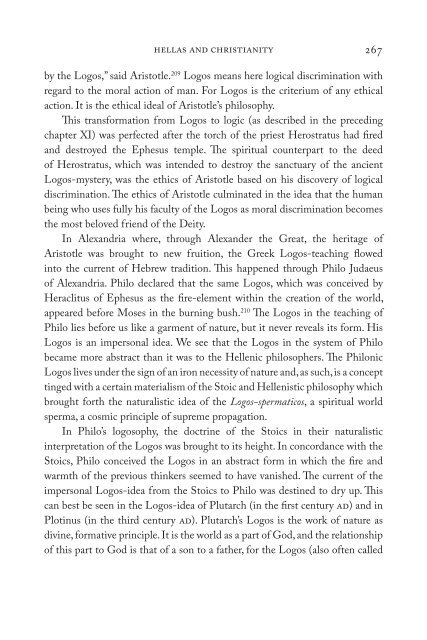The Gospel of Hellas - Research Institute for Waldorf Education
The Gospel of Hellas - Research Institute for Waldorf Education
The Gospel of Hellas - Research Institute for Waldorf Education
You also want an ePaper? Increase the reach of your titles
YUMPU automatically turns print PDFs into web optimized ePapers that Google loves.
hellas and christianity<br />
by the Logos,” said Aristotle. 209 Logos means here logical discrimination with<br />
regard to the moral action <strong>of</strong> man. For Logos is the criterium <strong>of</strong> any ethical<br />
action. It is the ethical ideal <strong>of</strong> Aristotle’s philosophy.<br />
This trans<strong>for</strong>mation from Logos to logic (as described in the preceding<br />
chapter XI) was perfected after the torch <strong>of</strong> the priest Herostratus had fired<br />
and destroyed the Ephesus temple. <strong>The</strong> spiritual counterpart to the deed<br />
<strong>of</strong> Herostratus, which was intended to destroy the sanctuary <strong>of</strong> the ancient<br />
Logos-mystery, was the ethics <strong>of</strong> Aristotle based on his discovery <strong>of</strong> logical<br />
discrimination. <strong>The</strong> ethics <strong>of</strong> Aristotle culminated in the idea that the human<br />
being who uses fully his faculty <strong>of</strong> the Logos as moral discrimination becomes<br />
the most beloved friend <strong>of</strong> the Deity.<br />
In Alexandria where, through Alexander the Great, the heritage <strong>of</strong><br />
Aristotle was brought to new fruition, the Greek Logos-teaching flowed<br />
into the current <strong>of</strong> Hebrew tradition. This happened through Philo Judaeus<br />
<strong>of</strong> Alexandria. Philo declared that the same Logos, which was conceived by<br />
Heraclitus <strong>of</strong> Ephesus as the fire-element within the creation <strong>of</strong> the world,<br />
appeared be<strong>for</strong>e Moses in the burning bush. 210 <strong>The</strong> Logos in the teaching <strong>of</strong><br />
Philo lies be<strong>for</strong>e us like a garment <strong>of</strong> nature, but it never reveals its <strong>for</strong>m. His<br />
Logos is an impersonal idea. We see that the Logos in the system <strong>of</strong> Philo<br />
became more abstract than it was to the Hellenic philosophers. <strong>The</strong> Philonic<br />
Logos lives under the sign <strong>of</strong> an iron necessity <strong>of</strong> nature and, as such, is a concept<br />
tinged with a certain materialism <strong>of</strong> the Stoic and Hellenistic philosophy which<br />
brought <strong>for</strong>th the naturalistic idea <strong>of</strong> the Logos-spermaticos, a spiritual world<br />
sperma, a cosmic principle <strong>of</strong> supreme propagation.<br />
In Philo’s logosophy, the doctrine <strong>of</strong> the Stoics in their naturalistic<br />
interpretation <strong>of</strong> the Logos was brought to its height. In concordance with the<br />
Stoics, Philo conceived the Logos in an abstract <strong>for</strong>m in which the fire and<br />
warmth <strong>of</strong> the previous thinkers seemed to have vanished. <strong>The</strong> current <strong>of</strong> the<br />
impersonal Logos-idea from the Stoics to Philo was destined to dry up. This<br />
can best be seen in the Logos-idea <strong>of</strong> Plutarch (in the first century ad) and in<br />
Plotinus (in the third century ad). Plutarch’s Logos is the work <strong>of</strong> nature as<br />
divine, <strong>for</strong>mative principle. It is the world as a part <strong>of</strong> God, and the relationship<br />
<strong>of</strong> this part to God is that <strong>of</strong> a son to a father, <strong>for</strong> the Logos (also <strong>of</strong>ten called

















